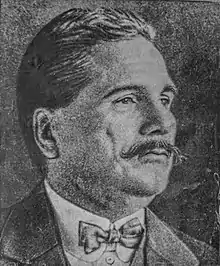| Author | Muhammad Iqbal |
|---|---|
| Country | British India |
| Language | Urdu |
| Genre | Philosophical poetry |
| Published | 1935 |
| ISBN | 978-1719472074 |
Baal-e-Jibril (Urdu: بال جبریل; or Gabriel's Wing; published in Urdu, 1935) is a philosophical poetry book by Allama Muhammad Iqbal, the great poet-philosopher of the South Asia.

Introduction
Iqbal's first book of poetry in Urdu, Bang-i-Dara (1924), was followed by Bal-i-Jibril in 1935 and Zarb-i-Kalim in 1936. Bal-i-Jibril is regarded as the peak of Iqbal's Urdu poetry. It consists of ghazals, poems, quatrains, epigrams and advises the nurturing of the vision and intellect necessary to foster sincerity and firm belief in the heart of the ummah and turn its members into true believers.[1]
Some of the verses had been written when Iqbal visited Britain, Italy, Palestine, France, Spain and Afghanistan, including one of Iqbal's best known poems The Mosque of Cordoba.
The work contains 15 ghazals addressed to God and 61 ghazals and 22 quatrains dealing with ego, faith, love, knowledge, the intellect and freedom. Iqbal recalls the past glory of Muslims as he deals with contemporary political problems.
Contents
|
Introduction
|
|
See also
Notes
- ↑ "Iqbal's works". Iqbal Academy Pakistan. Archived from the original on 17 August 2014. Retrieved 23 March 2006.
- ↑ "Bal-i-Jibril, translated by Naeem Siddiqui". Iqbal Academy Pakistan.
Further reading
- Schimmel, Annemarie (1963). Gabriel's Wing: Study into the Religious Ideas of Sir Muhammad Iqbal. Brill Archive. ISBN 969416012X.
External links
- Read online
- "Bal-i-Jibril". Iqbal Academy Pakistan.
- "Bal-i-Jibril". Iqbal Cyber Library.
- "Gabriel's Wing, English translation of Bal-i-Jibril by Naeem Siddiqui". Iqbal Academy Pakistan.
- Iqbal Academy, Pakistan
- "Homepage". Iqbal Academy Pakistan. Archived from the original on 21 February 2014. Retrieved 10 March 2006.